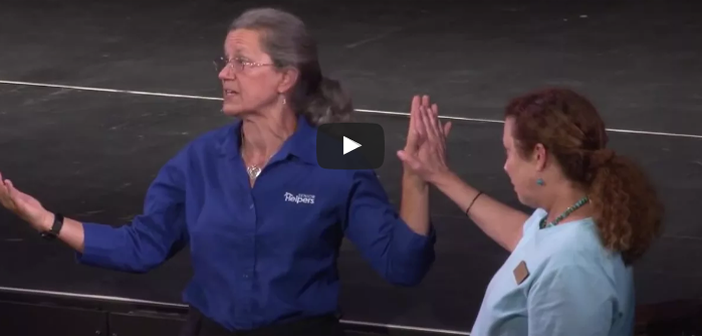
One of the most useful things I’ve learned on this dementia journey is that when people who live with dementia exhibit responsive behaviours which appear angry and/or aggressive there’s usually a perfectly reasonable and rational explanation for it – from their point of view.
Such behaviour is not random (although it may appear to be), it’s not willful (although it may appear to be), and it’s not their fault (although it may appear to be).
“Problematic” responsive behaviour is most often the result of:
- A physical issue they are unable to pinpoint and/or articulate (e.g. pain, incontinence issue)
- A “trigger” or triggers in the environment (e.g. noise, temperature, activity)
- How I or someone else has interacted with them
The obvious way to stop anger and aggression is to address the root cause:
- Find and address the physical issue
- Identify and remove the environmental trigger(s)
- Stop blaming them and start taking responsibility for causing responsive behaviours
In the third instance, dementia care expert Teepa Snow suggests learning, practicing and using these six simple phrases to acknowledge the person, accept responsibility, diffuse the situation, restore positive energy and create the opportunity for healing.
- “I’m sorry I was trying to help.”
- “I’m sorry I made you angry.”
- “I’m sorry I embarrassed you.”
- “I’m sorry I made you feel stupid.”
- “I’m sorry I didn’t mean to, but I treated you like a child.”
- “I’m sorry, this is really hard.”
Meaning what you say when you say these phrases is important. Putting yourself in their shoes is helpful. Ask yourself these 20 questions to imagine what they might be feeling.
You can experience the power of the statements in the video below in which Teepa plays the part of a care partner, and the woman in the light blue top plays the part of a person living with dementia.
I know these words work because I have said them many times myself.
I would add one more phrase: “You’re right. I’m sorry, I was wrong.”
Telling the other person they are right is extraordinarily powerful. It’s like throwing a big wet blanket on a small campfire – it smothers the flames immediately. Clearly the wet blanket will be less effective on a towering inferno; you must stop the fire before it gets out of control.
An even more effective strategy is to not do things that are helpful in intent but not helpful in reality, and to not do or say things that embarrass, demean, patronize or anger the person to start with! Then there’s no need to apologize 🙂
“I’m sorry” isn’t easy for most people to say. It’s even more difficult for family care partners with all kinds of goop in the relationship soup. But they work. They really do. Why? Because “suddenly you’re in a different place than you were. And that’s because you were willing to do something different.” If you want to change the dance, you’ve got to change the steps.
See also:
https://myalzheimersstory.com/2015/06/09/10-teepa-snow-videos-on-dementia-basics/


